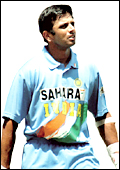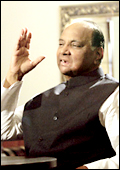|
Had
the board of Control for Cricket in India (BCCI) been a listed
company, it would have been right up there-with the Infosyses,
the Reliances and the TCSEs of this world-among the country's
top wealth creators. Since the beginning of this year, the new
Sharad Pawar-led team at BCCI has sealed deals that will see its
revenues increase to Rs 3,354 crore over four years starting March
2006 from Rs 359 crore during 2000-2004. That's an 834 per cent
increase over six years. Even the best performers of India Inc.
will be hard pressed to match that performance. About 80 per cent
of this comes from the sale of media rights.
It obviously helps that India is the new
Mecca of world cricket, accounting for 80 per cent of global television
viewership of 300-350 million and generating more than half its
advertising revenues. "Full credit to BCCI for being able
to monetise these eyeballs well," says Jamie Stewart, Global
Sponsorships Manager, International Cricket Council (ICC). The
cricket-oriented television advertising pie in India: about Rs
700 crore a year.
But despite this, Nimbus Communications'
$612.18-million (Rs 2,755 crore approx.) bid for the global television
rights to Indian cricket (2006-10) has raised eyebrows. The obvious
questions: how will it raise this amount? And, can it realistically
hope to earn a profit? "I will not reveal my business plan
to the media," says Harish Thawani, Chairman and promoter
of Nimbus.
| THE THREE HIGHEST BIDS |
| BIDDER |
AMOUNT
|
Nimbus Communications
(global rights) |
612.18
|
| Zee Sports (global rights) |
513.08
|
| ESPN-Star Sports (India
rights) |
401.89
|
| Figures in $ million |
Zee Telefilms had everyone doing double takes
when it bid $308 million (Rs 1,416 crore) in 2004; that bid got
bogged down in multiple litigations between Zee and the BCCI,
but set the floor for any future deals. So, ESPN-Star Sports quoted
a price of $401.89 million (Rs 1,809 crore) this time around.
"We increased our bid price after taking into account inflation,
the good showing of the Indian cricket team and the growing advertising
market," says R.C. Venkateish, Managing Director, ESPN India.
Zee, too, raised its bid by $205 million (Rs 923 crore approx.)
to $513 million (Rs 2,309 crore approx.). Says Himanshu Modi,
Business Head, Zee Sports: "We bid for the global rights
in order to bolster our overall broadcast business." Explaining
this, he says it would have given his fledgling channel a flying
start; given dish TV, the group's DTH venture, an edge over its
competitors and "allowed Zee to monetise its expanding global
footprint".
| BCCI's BIG DEALS |
| Leading arm and main sponsor |
Sahara Group
Rs 415 crore for 4 years
|
| Team kit sponsorship, apparel
license & non-leading arm sponsor |
Nike Rs 215 crore for 4 years
|
| Media rights |
Nimbus Communications Rs 2,724 crore
for 4 years
|
But, what was the rationale behind Thawani's
bid? A top executive in a media company says Nimbus, a Mumbai-based
media and sports production and marketing company, "has largely
remained a fringe player in its chosen businesses". Thawani
hotly contests this. "Nimbus has produced over 5,000 hours
of television programming in the past 15 years," he had told
BT earlier. But, it's still not counted among the top TV content
producers. "Nimbus has done cricket-related transactions
worth Rs 6,700 crore over the past five years," he adds,
but refuses to share details. "Nimbus is India's leading
provider of mobile content services," he claims. "I'm
not aware of it," says a leading mobile content provider.
 A
senior BCCI official seems closest to the mark when he says: "The
bid looks like a desperate do-or-die attempt by him to make a
mark. This deal might just change his fortunes forever; but if
he fails, it won't be for the first time." Adds Lalit Modi,
Chairman of BCCI's Marketing Committee: "According to the
terms of the deal, Nimbus has to pay us an advance fee of Rs 200
crore and provide us bank guarantees of $150 million (Rs 675 crore)
every year for the next four years." Of these, Nimbus has
already paid BCCI Rs 160 crore and is in the process of tying
up the remaining funds. Where will Nimbus raise this money from?
Thawani says he has no immediate plans of approaching the markets.
Can he generate the revenues to cover this amount? "No comments,"
he says. A
senior BCCI official seems closest to the mark when he says: "The
bid looks like a desperate do-or-die attempt by him to make a
mark. This deal might just change his fortunes forever; but if
he fails, it won't be for the first time." Adds Lalit Modi,
Chairman of BCCI's Marketing Committee: "According to the
terms of the deal, Nimbus has to pay us an advance fee of Rs 200
crore and provide us bank guarantees of $150 million (Rs 675 crore)
every year for the next four years." Of these, Nimbus has
already paid BCCI Rs 160 crore and is in the process of tying
up the remaining funds. Where will Nimbus raise this money from?
Thawani says he has no immediate plans of approaching the markets.
Can he generate the revenues to cover this amount? "No comments,"
he says.
The general consensus is that it's going
to be a tough ride for Nimbus. According to Modi's calculations,
"Nimbus will have to generate around $700 million (Rs 3,150
crore) to break even"; that's because logistics and other
expenses will add about $90 million (Rs 405 crore) to his costs.
To earn a 20 per cent profit, he will have to generate another
$140 million (Rs 630 crore). "On the face of it, the target
does look daunting," says ICC's Stewart. "But Thawani
might have something big up his sleeve," he adds.
| RIGHTS HELD BACK BY BCCI |
»
Mobile telephony
» Archive
rights after 72 hours of broadcast
» IPTV
rights
» All
future technologies
» Public
exhibition and film rights
Board expects to raise Rs 1,500 crore from selling these rights
a senior BCCI official says that (Thawani's) bid looks like
a desperate do-or-die attempt |
For the moment, all he's got in the bag is
a $20-million (Rs 90-crore) deal with Sky Sports for the UK rights.
North America, with an Asian viewership of around 100,000-150,000,
"is quite lucrative from the subscription point of view,"
says Stewart. This can, at best, generate around $50 million (Rs
225 crore) over four years. Other markets like South Africa, Australia,
Fiji, Nigeria, and Greece are practically non-starters. That means
he will, as expected, have to generate the bulk of his revenues
from India. And Thawani is confident he can do that. "The
global economy is in good shape. India is also doing well. Several
sectors, like telecom and insurance, will see explosive growth;
companies in these, and other sectors, will have to advertise
in order to reach a pan-India audience. For that, cricket is the
ideal vehicle," he says. For now, Nimbus has tied up with
nondescript channels like Sahara One and Sahara Filmi, launched
20 days ago, for the ongoing India-England series. Sources say
the deal is that Nimbus markets the airtime and gives Sahara 25
per cent of the gross. This way, Thawani reaches his audience
and the channels get additional revenues, and more importantly
viewership.
| A CONSUMMATE DEALMAKER |
| The man is street
smart. "He's the proverbial fly that flies from food
to food," says a broadcaster who has known him for several
years now, candidly admitting that he admires the man. That
sums up the paradox of the 46-year-old Harish Thawani-he's
admired for his go-getting style, but rarely makes it to anyone's
list of most popular people in the television, broadcasting
and sports marketing business.
The founder of Nimbus Communications, which he set up
in 1987, Thawani shot to fame in the early 90s when he produced
Superhit Muqabla, a countdown show. Since then, he's been
in the news off and on, mostly for his association with
cricket marketing around the world. Nimbus marketed the
2003 World Cup, which was held in South Africa (in fact,
he marketed it worldwide). Earlier, in 2000, he was also
in the news for the wide media coverage he received for
his proposed, but ultimately aborted, plan to launch a Rs
200-crore initial public offering (IPO) for his company.
Thawani is a born dealmaker, say sources, but his formidable
skills in this department are hobbled by his inability to
build teams. "He does not care about his employees.
It is only power and money that gives him kicks," says
a former employee. Thawani's got plenty of that. In 2005,
he sold a 33 per cent stake in his company to private equity
major 3i for $45 million (Rs 200 crore at the exchange rate
prevailing then). That means Nimbus is worth at least $135
million (Rs 607.5 crore). He's now on to the biggest deal
of his life; and he looks slightly out of his depth. But
not even his enemies (and he's got plenty of those, too)
are writing him off yet.
Krishna Gopalan
|
 |
"Nimbus has to
give guarantees of $150 million every year for the next four
years"
Lalit Modi
Chairman/BCCI's Marketing Committee |
According to media buying sources, Nimbus,
which is selling the airtime for both Doordarshan and Sahara,
went to the market with an asking rate of around Rs 3-3.5 lakh
per 10 seconds for Sahara and Rs 2 lakh per 10 seconds for dd.
Most advertisers were not ready to pay more than Rs 2-2.5 lakh
per 10 seconds for the satellite channels and Rs 1 lakh for the
terrestrial platform. "Rates for cricket broadcast have stabilised
and there can be no compromise there. If that means absence from
cricket, so be it," says Sunder Raman, General Manager of
Mindshare, who buys media for Pepsi. In fact, big cricket advertisers
like Pepsi, Hero Honda, LG, Castrol, etc., have chosen to keep
out of the India-England series this time. "This is the first
time in five years that Pepsi is not advertising during a high-profile
cricket series," says Raman. Reason? "The ad rates this
time were absolutely unreasonable," he says. Adds Hemant
Sachdev, Director (Marketing and Communications), Bharti Airtel:
"Products have to be relevant in the context of price and
value, otherwise there are always other options available in the
market and that holds true for every business."
Cricket, incidentally, is no longer the only
property delivering high television rating points (TRPs). The
recently concluded India-Pakistan cricket series garnered 8-10
TRPs, whereas popular serials like Kyunki Saans Bhi Kabhi Bahu
Thi and Kahani Ghar Ghar Ki on star Plus continue to deliver TRPs
of between 10 and 14. Market sources say Nimbus will not be able
to net more than Rs 45-50 crore from the telecast of the three
Test matches and six One Day Internationals (ODIs) against England.
Meanwhile, the telecast has got entangled in a minor controversy.
"None of the three entities (BCCI, Sahara One and Nimbus)
has permission for live telecast of the series," say sources.
Counters Thawani: "We are using Doordarshan's uplinking facilities,
so there is no violation of any norms."
THOSE WHO WENT BUST
Sky-high bids have led to a few bankruptcies,
too. |
|
Harish Thawani's nimbus communications
is not the first company in the world to pay eye-popping
amounts for media and marketing rights of high-profile sporting
events. And if it goes belly up in the process (which is
not really a very remote possibility), it won't be the first
to do so. Here's a look at two other companies that blazed
the rather dubious trail in this regard:
International Sports Media & Marketing: ISMM
filed for bankruptcy in Switzerland in March 2001 after
it accumulated over $425 million (Rs 1,997.5 crore) in debts.
The company-founded in 1982 by Horst Dassler of Adidas,
and one of the biggest sports marketing companies in the
world at the time of its collapse-had committed $549 million
(Rs 2,580 crore approx. at the exchange rate prevailing
then) for the European and US marketing rights for the 2002
Soccer World Cup and $434 million (Rs 2,040 crore) for the
European rights to the 2006 edition of the tournament. It
had earlier lost massive amounts on the 1994 Olympics. It
couldn't find enough sponsors and went down under a mountain
of unpaid debts.
Kirch Group: Media mogul Leo Kirch, who bought
the back-to-back rights to the 2002 and 2006 Soccer World
Cups from ISMM, filed for bankruptcy in Munich in April
2002, when he, too, couldn't cash in on the event as per
his expectations. Ambitious plans to foray into Germany's
lucrative soccer league and the Formula One circuit also
came a cropper. The group's outstanding debt at the time
of collapse stood at around $5.5 billion (Rs 26,950 crore
approx.).
-Archna Shukla
|
Such minor procedural glitches are inevitable
in one-off arrangements such as the one between Nimbus and Sahara
One. Over a longer term, Thawani says he will either create a
global cricket network or buy an existing sports channel. But
in case he is not able to do so, he will have to tie up with a
stronger broadcaster the next time, industry players say. Other
channels, which had quoted lower amounts for the primary bid,
are unlikely to pay him the premium. "It will be unrealistic
to expect more than $400-410 million (Rs 1,800-1,845 crore) over
the period of the contract," says Zee's Modi. "The advertising
market for cricket has plateaued and subscription rates can neither
be raised nor realised fully, due to rampant under-declaration
of subscription numbers," says ESPN's Venkateish. Sources
say Thawani chose Sahara One because the other broadcasters refused
to play ball with him.
 |
| BCCI's Pawar: Midas touch |
Also, as Modi points out, "in 2006, India
plays only the ongoing India-England series at home. This should
bring down the value of the rights by at least 10-12 per cent."
The radio and broadband rights can fetch Nimbus a maximum of Rs
150-200 crore over the period of the contract. Thus, it looks
like Thawani will net about Rs 2,000 crore from these sources.
But, that will still leave him about Rs 1,000 crore in the red.
He can think of profits only after filling this huge hole in his
P&L accounts. How will he do it? Will he be able to recover
this money from regional markets that he has been talking about?
"Looks unlikely," says a broadcaster. Thawani says he
will wait for "multiple platforms to emerge and go in for
non-exclusive licensing agreements with different players to maximise
revenues". But industry sources say this will bring prices
down further. "Broadcasters pay a premium for exclusivity.
If the same property is available on all platforms, why will anyone
pay a premium for it?" asks Venkateish.
Thawani, though, exudes bravado. "Indian
cricket is our biggest brand ambassador. And my mission is to
go live in every continent," he says. His mission statement
is laudable. And achieving his mission goals may also not stretch
him too much. But whether he can do it profitably is what everyone
will be watching out for. If he can, he'll prove yet again that
there's no alternative to native intelligence, street smarts and
business chutzpah. But if he can't-and the odds on this seem heavier-he
won't be the first sports marketer to go belly up. But everyone
BT spoke to swore that if anyone can pull it off, it will be Thawani.
|





 A
senior BCCI official seems closest to the mark when he says: "The
bid looks like a desperate do-or-die attempt by him to make a
mark. This deal might just change his fortunes forever; but if
he fails, it won't be for the first time." Adds Lalit Modi,
Chairman of BCCI's Marketing Committee: "According to the
terms of the deal, Nimbus has to pay us an advance fee of Rs 200
crore and provide us bank guarantees of $150 million (Rs 675 crore)
every year for the next four years." Of these, Nimbus has
already paid BCCI Rs 160 crore and is in the process of tying
up the remaining funds. Where will Nimbus raise this money from?
Thawani says he has no immediate plans of approaching the markets.
Can he generate the revenues to cover this amount? "No comments,"
he says.
A
senior BCCI official seems closest to the mark when he says: "The
bid looks like a desperate do-or-die attempt by him to make a
mark. This deal might just change his fortunes forever; but if
he fails, it won't be for the first time." Adds Lalit Modi,
Chairman of BCCI's Marketing Committee: "According to the
terms of the deal, Nimbus has to pay us an advance fee of Rs 200
crore and provide us bank guarantees of $150 million (Rs 675 crore)
every year for the next four years." Of these, Nimbus has
already paid BCCI Rs 160 crore and is in the process of tying
up the remaining funds. Where will Nimbus raise this money from?
Thawani says he has no immediate plans of approaching the markets.
Can he generate the revenues to cover this amount? "No comments,"
he says. 
